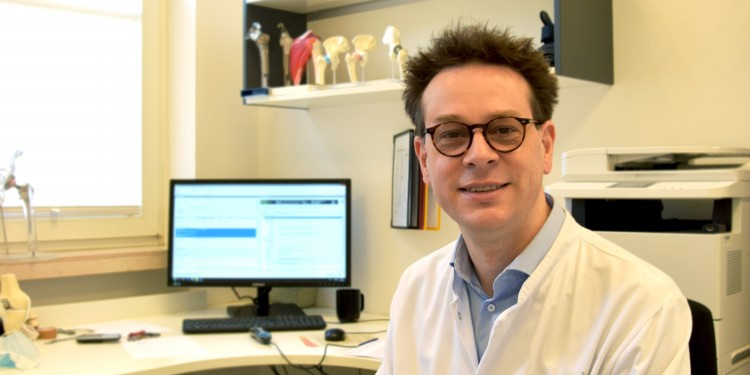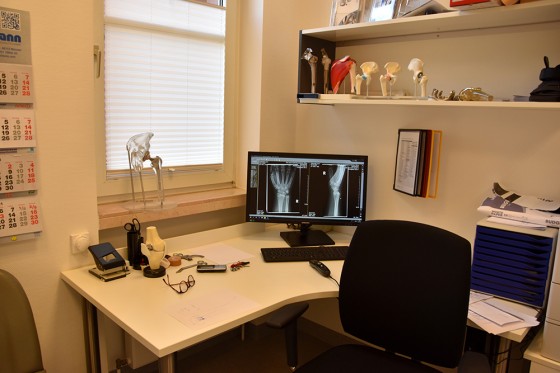
When 90 percent is not enough
“What’s special about our hand?” Dr. Ingo Budweg asks the twelve students from Münster’s University of Music in a Zoom meeting. The participants in the “Applied Medicine for Musicians” seminar can be seen thinking hard, until Budweg – a senior physician in the Department of Trauma, Hand and Orthopaedic Surgery at Münster’s Herz Jesu Hospital – finally enlightens them. “It’s the possibility it gives us to apportion strength precisely,” he explains. “You can take an egg out of the fridge without breaking it. If necessary, though, you can also summon up all your strength to lift an anvil, for example.” But what do these examples have to do with music? Ingo Budweg is certain that an understanding of processes in the body helps students, while they are making music, to recognize possible alarm signals indicating illnesses or disorders before it is too late.
In his course, students learn about what happens in the body when different instruments are played or when they are listening, as well as about how important health and well-being are for making music, and, last but not least, about how they can prevent typical musicians’ problems such as putting too much strain on the arms or fingers. “During their musical studies, which are strenuous, or later as professional musicians, an injury to the hand can mean the end of a musician’s career,” Budweg explains. “So it’s important that they take even the smallest signals seriously, that they take care of themselves, and that they consult a doctor sooner rather than later in order to avoid any irreparable damage.” This is why, in the Zoom session, he explains not only the anatomy of the parts of the body being subjected to strain, but also how long injuries to tendons and ligaments in this area need to recover completely and how great the danger of a relapse is if practising is resumed at too early a stage.

The seminar is compulsory for students at the University of Music. The collaboration between Faculty 15 of the University of Münster and the Herz Jesu Hospital has been going since 2012. A major concern for Barbara Plenge, Dean of Studies at the University of Music, is to promote good health among the musicians. “Psychology for musicians and medicine for musicians are designed to ensure a life of music-making which is as free as possible from any health problems and psychosocial issues,” she explains – because such complaints, and the interruptions to practice which they entail, can represent a major setback, precisely for ambitious musicians aiming at a career as a soloist.
Ingo Budweg also understands the young musicians’ ambition, and the urge to be fit again fast, as he too is a passionate musician. After his medical studies he embarked on a study of music, with the French horn as his main instrument and piano as a subsidiary. He is also a co-founder of the “Freies Musical-Ensemble der Universität Münster”. Since this time he has been trying to combine music and medicine – in his work, too. Budweg, who lectures at Münster University, also invites his course participants to come to his consultation hours for hand surgery at the Herz Jesu Hospital. “I try to be someone the students can come and talk to, someone who understands their worries and their fears that they may no longer be 100 percent fit or will be unable to work for a longer period of time,” he explains.
Music student Rebekka Wilhelm has already been to see Ingo Budweg in his consultation hour. “He gave me a straightforward assessment of my problem and some tips on how to deal with it,” she says. “I felt I was in good hands with him, if you’ll forgive the pun, – not only because he’s a hand specialist, but also because he’s a musician.” For the doctor himself it goes without saying that he addresses the special needs which musicians have. “A journalist can still do his job after an accident which results in a ten percent reduction in the use of his hand,” Budweg explains. “By contrast, a musician with a hand which has recovered to a level of only 90 percent will probably be unable to continue in his or her career.” This is why it is important, he says, to make sure that appointments for operations are made quickly, to look for the precise causes of any disorder, and to get good advice.
This is precisely what Budweg tries to do in his consultation hours at the hospital in Hiltrup, just south of Münster. There is a queue of patients waiting to see him outside his office. He asks every visitor about their hobbies and the job they have. What is also important for him is to be always up to date with medical developments. When a patient comes to see him with a painful hand after a fall, the doctor first arranges for a special type of X-ray to be done in order to analyse the extent of the injury. With the so-called pencil-grip X-ray, in which the patient grips a pencil with both hands while the image is being made, the doctor can perfectly compare the small bones in the hand with one another and recognise any damage.
Always be attentive and retain a thirst for knowledge – this is his aspiration, which he also wants to pass on to the participants in his seminars. “After all, today’s music students are tomorrow’s music teachers – who can change a lot,” he says.
